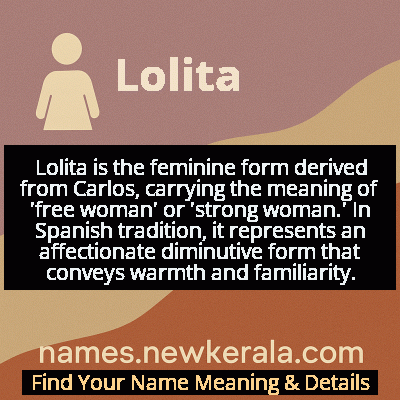Lolita Name Meaning & Details
Origin, Popularity, Numerology Analysis & Name Meaning of Lolita
Discover the origin, meaning, and cultural significance of the name LOLITA. Delve into its historical roots and explore the lasting impact it has had on communities and traditions.
Name
Lolita
Gender
Female
Origin
Spanish
Lucky Number
6
Meaning of the Name - Lolita
Lolita is the feminine form derived from Carlos, carrying the meaning of 'free woman' or 'strong woman.' In Spanish tradition, it represents an affectionate diminutive form that conveys warmth and familiarity.
Lolita - Complete Numerology Analysis
Your Numerology Number
Based on Pythagorean Numerology System
Ruling Planet
Venus
Positive Nature
Harmonious, responsible, caring, and artistic.
Negative Traits
Overly idealistic, superficial, possessive, or jealous.
Lucky Colours
Pink, turquoise.
Lucky Days
Friday.
Lucky Stones
Diamond, turquoise.
Harmony Numbers
2, 3, 9.
Best Suited Professions
Artists, musicians, teachers, healthcare workers.
What People Like About You
Warmth, nurturing nature, artistic flair.
Famous People Named Lolita
Lolita Flores
Singer and Actress
Renowned Spanish singer and actress, daughter of Lola Flores, known for flamenco-pop fusion
Lolita Chammah
Actress
French actress known for her work in European cinema, daughter of actress Isabelle Huppert
Lolita Torres
Actress and Singer
Argentine actress and singer, iconic figure in Latin American cinema and television
Lolita Lebrón
Political Activist
Puerto Rican nationalist who led 1954 attack on U.S. Capitol to protest Puerto Rico's status
Name Variations & International Equivalents
Click on blue names to explore their detailed meanings. Gray names with will be available soon.
Cultural & Historical Significance
The name's journey from a simple Spanish diminutive to a cultural phenomenon illustrates how literature can transform linguistic perception. In its original context, Lolita carried no negative connotations and was simply an endearing form of address. The novel's impact demonstrates the power of art to redefine language and create lasting cultural associations that transcend geographical and linguistic boundaries. This transformation has made Lolita a case study in how names acquire layered meanings through cultural artifacts.
Extended Personality Analysis
Individuals named Lolita are often perceived as charismatic and emotionally expressive, with a natural charm that draws people to them. They tend to possess a creative spirit and artistic sensibility, often excelling in fields that allow self-expression. The name suggests someone who is both playful and deeply sensitive, capable of great warmth and emotional depth. Lolitas are frequently described as having a magnetic personality combined with resilience, able to navigate complex emotional landscapes with grace.
These individuals often display a unique blend of traditional femininity and modern independence, creating a compelling personal presence that leaves a lasting impression on others. They tend to be intuitive and perceptive, with an ability to understand subtle emotional cues. The name carries an expectation of sophistication mixed with approachability, and those who bear it often develop a strong sense of self-awareness. Despite the name's controversial literary associations, many Lolitas embrace their distinctive name as part of their identity, developing a thoughtful perspective on how names shape personal narrative.
Modern Usage & Popularity
In contemporary usage, Lolita remains a complex name choice due to its literary associations. While still used in Spanish-speaking countries as an affectionate diminutive, its popularity has declined in English-speaking nations following the novel's publication. Recent years have seen some reclamation attempts, particularly in artistic and literary circles where the name's controversial history is acknowledged but reinterpreted. The name appears occasionally in birth registries, often chosen by parents who appreciate its melodic quality or wish to honor Spanish heritage, though many remain cautious due to the strong cultural associations with Nabokov's work. Current usage trends show it's more common as a middle name or in communities where the literary reference is less prominent.
Symbolic & Spiritual Meanings
Symbolically, Lolita represents the tension between innocence and experience, youth and maturity, purity and corruption. The name has become a metaphor for the loss of childhood innocence and the complex relationship between beauty and morality. In broader cultural contexts, it symbolizes the power of literature to shape perception and the enduring nature of controversial artistic works. The name also carries undertones of forbidden desire and the objectification of youth, making it a potent symbol in discussions about sexuality, consent, and cultural taboos. Despite these heavy associations, in its original Spanish context, it maintains symbolic connections to maternal love and religious devotion through its link to the Virgin Mary, creating a rich tapestry of contrasting meanings.

